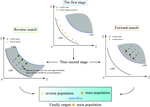Complex & Intelligent Systems ( IF 5.8 ) Pub Date : 2024-04-15 , DOI: 10.1007/s40747-024-01418-y Cancan Liu , Yujia Wang , Yunfeng Xue

|
Abstract
Constrained multiobjective optimization problems (CMOPs) are widespread in reality. The presence of constraints complicates the feasible region of the original problem and increases the difficulty of problem solving. There are not only feasible regions, but also large areas of infeasible regions in the objective space of CMOPs. Inspired by this, this paper proposes a bidirectional coevolution method with reverse search (BCRS) combined with a two-stage approach. In the first stage of evolution, constraints are ignored and the population is pushed toward promising regions. In the second stage, evolution is divided into two parts, i.e., the main population evolves toward the constrained Pareto front (CPF) within the feasible region, while the reverse population approaches the CPF from the infeasible region. Then a solution exchange strategy similar to weak cooperation is used between the two populations. The experimental results on benchmark functions and real-world problems show that the proposed algorithm exhibits superior or at least competitive performance compared to other state-of-the-art algorithms. It demonstrates BCRS is an effective algorithm for addressing CMOPs.
Graphical Abstract
中文翻译:

约束多目标优化的逆向搜索两阶段双向协同进化算法
摘要
约束多目标优化问题(CMOP)在现实中广泛存在。约束的存在使原问题的可行域变得复杂,增加了问题求解的难度。 CMOP的目标空间中不仅存在可行区域,还存在大面积的不可行区域。受此启发,本文提出了一种结合两阶段方法的反向搜索双向协同进化方法(BCRS)。在进化的第一阶段,限制被忽略,人口被推向有希望的地区。第二阶段,演化分为两部分,即主种群向可行区域内的约束帕累托前沿(CPF)演化,而反向种群则从不可行区域向CPF演化。然后在两个群体之间使用类似于弱合作的解决方案交换策略。基准函数和现实问题的实验结果表明,与其他最先进的算法相比,所提出的算法表现出优越或至少具有竞争力的性能。它表明 BCRS 是一种解决 CMOP 的有效算法。



























 京公网安备 11010802027423号
京公网安备 11010802027423号